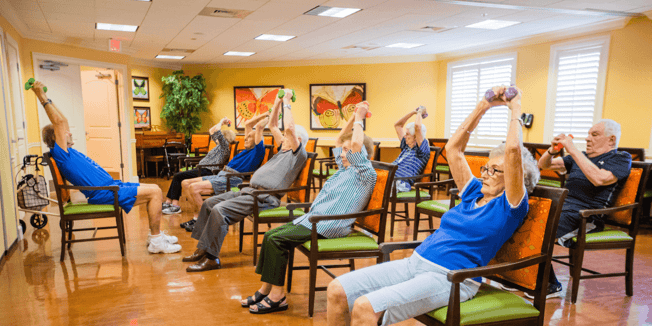Get specialized attention with professional Memory Care services.
The Role of Assisted Residing In Giving Specialized Look After Dementia Sufferers
The arrangement of specialized take care of mental deterioration patients within assisted living centers is significantly identified as a crucial part of reliable dementia monitoring. These settings are made to attend to the one-of-a-kind cognitive and psychological obstacles faced by people with mental deterioration, providing customized assistance that promotes safety and security and well-being. By integrating organized routines and engaging tasks, helped living can mitigate feelings of isolation while boosting total top quality of life. Nonetheless, the performance of these programs often rests on different elements, including staff training and household involvement, prompting a closer assessment of just how these components communicate to enhance treatment results.
Comprehending Dementia Treatment Requirements
Understanding the treatment demands of people with mental deterioration is crucial for giving efficient support and boosting their high quality of life. Mental deterioration is a progressive neurological problem that impacts cognitive features such as memory, reasoning, and communication. People with dementia commonly need help with day-to-day tasks, customized care strategies, and emotional support.
Effective mental deterioration care entails acknowledging the distinct obstacles dealt with by each person. This includes comprehending the stages of dementia, which can range from light cognitive disability to innovative stages needing extensive aid. Treatment requires might encompass assistance in managing daily routines, drug adherence, and keeping social interactions to avoid isolation.
In addition, sensory excitement and familiar settings can considerably enhance the wellness of people with mental deterioration. Caregivers need to be educated to determine behavior adjustments and utilize methods customized to every individual's choices and past experiences. Strategies such as recognition treatment and memory can aid interact effectively and promote a complacency.
Inevitably, effectively dealing with the care demands of individuals with dementia requires a compassionate strategy, continuous training for caretakers, and a commitment to keeping dignity and respect throughout the caregiving process.
Advantages of Assisted Living

Assisted living advertises social communication amongst residents, fostering a feeling of neighborhood and belonging. Involving with peers can ease sensations of seclusion, which are usual in those living with mental deterioration.
Furthermore, several assisted living facilities provide support with everyday activities, such as medication management, bathing, and dish prep work. This support enables citizens to preserve their self-reliance while ensuring their health and well-being are focused on. Ultimately, assisted living acts as a valuable resource, stabilizing treatment and autonomy for individuals with mental deterioration and their family members.

Specialized Programs and Activities
(Memory Care Charlotte)Acknowledging the one-of-a-kind requirements of people with dementia, many nursing home implement customized programs and activities made to enhance cognitive feature and advertise general wellness. These programs typically include cognitive stimulation tasks that involve citizens in memory games, puzzles, and memory treatment, which motivates the sharing of personal tales and previous experiences.
Additionally, art and songs therapy play substantial roles in cultivating imagination and psychological expression (Assisted Living). Engaging homeowners in painting, crafting, or songs sessions can supply healing benefits, helping to decrease stress and anxiety and boost mood. Exercises, such as mild exercises and dance sessions, are additionally important, as they advertise wheelchair and physical health while motivating social communication among citizens
Structured everyday regimens are typically developed to offer a feeling of security and predictability for individuals with dementia. These regimens can consist of scheduled dish times, team activities, and individualized care plans that deal with specific interests and capabilities. By developing an enriching atmosphere loaded with tailored activities, helped living centers not just enhance the high quality of life for mental deterioration people but likewise cultivate a feeling of community and belonging.
Trained Personnel and Assistance
(Memory Care Charlotte)In aided living facilities, the visibility of skilled staff is critical for offering reliable support to people with dementia. These experts have specialized understanding and abilities to deal with the one-of-a-kind needs of citizens, ensuring their security, convenience, and well-being. Employee receive training in dementia treatment, which includes comprehending the development of the disease, acknowledging behavior adjustments, and employing efficient interaction strategies.
Moreover, experienced staff are geared up to apply customized care strategies customized per local's choices and capabilities. This individualized technique cultivates a feeling of freedom and self-respect, enabling citizens to participate in meaningful activities that boost their top quality of life. The staff also play an essential function in checking health and wellness and health, quickly determining any type of adjustments in condition that might require clinical interest.
In enhancement to guide care, trained staff supply emotional support to citizens, assisting to alleviate feelings of confusion and stress and anxiety that usually go along with dementia. Their thoughtful method produces a caring atmosphere where locals feel valued and recognized - Memory Care. Ultimately, the know-how and devotion of qualified team are vital in delivering detailed treatment that satisfies the complex demands of people coping with dementia in assisted living settings
Family Participation and Resources
Family involvement plays a substantial function in the care of individuals with dementia in assisted living facilities. Engaging member of the family in the care procedure not just boosts the psychological well-being of the resident but Look At This likewise promotes a collective setting where treatment strategies can be customized to individual needs. Family members can provide valuable insights right into the choices, history, and actions of their enjoyed ones, which can educate caregivers and cause more customized treatment strategies.
Furthermore, assisted living centers frequently use resources for households, such as support system and instructional workshops. These sources can aid households recognize dementia, enhance communication methods, and develop coping devices. Participation in these programs can equip household participants, outfitting them with the tools essential to support their liked ones successfully.
In addition, routine interaction between households and personnel is vital. This recurring discussion enables households to stay educated regarding their liked one's progression and any type of changes in treatment plans. Inevitably, a strong collaboration between families and aided living facilities fosters a setting of trust and understanding, guaranteeing that individuals with mental deterioration obtain the specialized treatment they are entitled to while preserving their family connections.
Conclusion
In final thought, aided living centers play a vital role in attending to the unique demands of mental deterioration clients via personalized care and support. By fostering secure atmospheres, advertising social communication, and implementing organized regimens, these facilities enhance the total wellness of residents. The involvement of trained team and families additionally improves the care experience, making certain that private preferences and backgrounds are valued. Eventually, assisted living supplies vital sources that considerably boost the top quality of life for those dealing with mental deterioration.